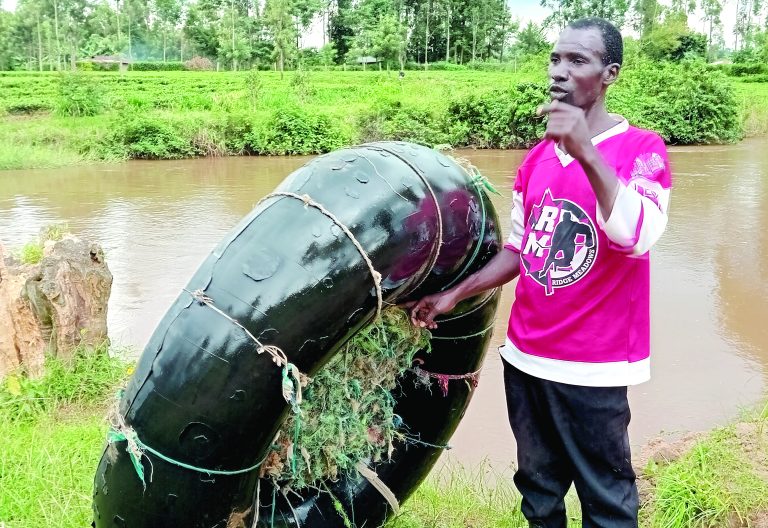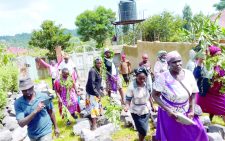Duo’s dive into the whistles of death to rescue community

Samuel Kibet and Effort Sowoi are enduring a chilly 6am morning, walking through lush tea plantations down to the river. The duo has taken it upon themselves to assist members of their community ply between Kiprambu and Taunet villages by ferrying residents along the river.
The Yala River smoothly meanders through Kimondi forest and dissects villages through the expansive Nandi forest in Chesumei, Nandi county.
The river’s red-dirty water falls thunderously, pounding the cliffs and whistles can be heard where the water negotiates with the reeds at the edges.
Some residents claim the river swells during the heavy rain seasons and the ‘whistles of death’ are so rampant, it has to claim lives through drowning into the Yala.
Every year, around two or three persons, including school-going children, die by drowning into the deepest sections of the river.
Makeshift boat
Samuel and Effort unpack a huge tube and painstakingly inflate it by mouth, they then quickly shut the valve with a lid to prevent deflation and ferry locals across the swollen river.
“This is just a second-hand tube I bought purposely for transportation and it has served for years as a mobile bridge or a makeshift boat for the locals,” Kibet tells People Daily.
As the residents pursue their daily economic errands, Kibet, who lives some hundreds of metres from the river bank, has been always available when needed.
For years, transportation infrastructure has been a problem to the locals across the villages and impacted accessing markets for their agricultural commodities.
Locals are usually forced to use long, costly routes and the motorbikes that are the modern last-mile means of transportation have not been of any help to them to cross the 40 metre-wide Yala.
“Trucks ferrying sugarcane and tea cannot access some areas along the river and locals have to transport the produce to the collection points, which are five kilometres away. We only enable children and adults to cross the river,” narrates Kibet.
The man-made bridges would not be applicable for the wide river and the floaters have come in handy in transportation of the learners from Mumbor, Taunet and Chepsonoi primary schools.
The duo does not charge students to cross the river. They say they are volunteers who offer support to the community and protect the children, the latter whom sadly provide larger statistics of those that often perish in Yala’s ‘whistles of death’.
According to the residents, over 20 people have died by drowning into River Yala between 2010 and 2021. Due to such tragic accidents, the locals have devised their own mitigation measures.
Sowoi says that they charge Sh10 per head though in many cases they are forced to ferry the majority of the villagers for free.
“We can make up to Sh300 per day from those who can afford to pay. It’s just a small fee and we largely play a critical role in protecting lives and enabling swift transportation across the villages,” he said.
Kibet and Sowoi said that even in the middle of the night they are called upon to attend to emergency cases including ferrying sick persons. They are not only the drivers of the floaters but also skilled in diving.
“For over twenty years, I have been living along the river and had to learn diving skills to handle emergency incidents that normally occurred in the area,” Sowoi reveals.
He reveals that the county government promised to put a bridge to enhance transportation between the two villages but it has not been actualised, which means the residents must devise their own means.
“It is a matter of life and death floating a loaded tube and countering water currents across the river. We have to use a lot of energy propelling the floater from one side to the other, thanks to the trust and confidence people have in us,” said Mr Sowoi.












